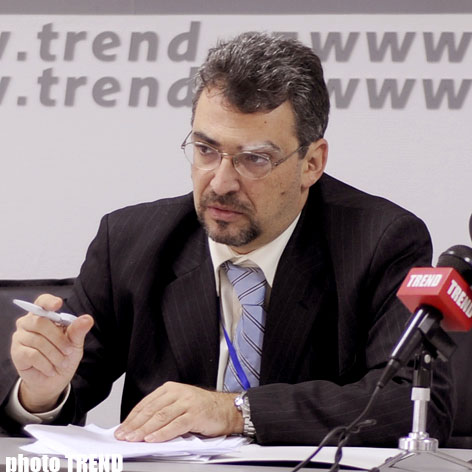Azerbaijan, Baku, June 11 / Trend, E.Tariverdiyeva/
The right to repel aggression is included in the UN Charter and the organization's member countries comply with the document, so that real or imaginary differences between the Azerbaijani Constitution and military doctrine are not so important, Ariel Cohen, the Heritage Foundation's leading expert on Russia, Eurasia and international energy security, believes.
"To my mind, ongoing occupation of the Azerbaijani territories as a result of a military conflict in 1988-1994 gives a right to Azerbaijan to use force to restore the sovereignty and territorial integrity", Cohen told Trend by e-mail.
The Azerbaijani parliament adopted the doctrine at an extraordinary meeting June 8.
One of the document's paragraphs states that Azerbaijan reserves the right, using all necessary means, including military force, to free our occupied territories from the occupation and restore the territorial integrity and sovereignty.
Armenian Foreign Minister Edward Nalbandian believes Azerbaijan's military doctrine approved by the parliament is contrary to the Azerbaijani Constitution and the amendment on the possibility of using force "to free the occupied territories and restore territorial integrity" is unconstitutional - "there is a special article, which excludes addressing of issues through war or military action".
The Constitutions' Article 9 states that Azerbaijan rejects war as a mean of encroaching on the independence of other states and as a means of resolving international conflicts.
However, the Nagorno-Karabakh conflict does not fall under this definition, as it is internal, the experts say. Consequently, Azerbaijan's military doctrine does not contradict the ninth article of the Constitution.
Of course, the Azerbaijani Constitution did not mean the abolition of this natural law, the more that Nagorno-Karabakh is not recognized by any country in the world, Cohen said.
"Thus, theoretically, the future conflict over Karabakh, if it happens, will be an operation to restore the sovereignty, and in the case of the Armenian forces' participation - self-defense under the UN Charter," Cohen wrote Trend in an e-mail.
The conflict between the two South Caucasus countries began in 1988 when Armenia made territorial claims against Azerbaijan. Armenian armed forces have occupied 20 percent of Azerbaijan since 1992, including the Nagorno-Karabakh region and 7 surrounding districts. Azerbaijan and Armenia signed a ceasefire agreement in 1994.
The co-chairs of the OSCE Minsk Group - Russia, France, and the U.S. - are currently holding the peace negotiations.
Armenia has not yet implemented the U.N. Security Council's resolutions on the liberation of the Nagorno-Karabakh region and the occupied territories.
Do you have any feedback? Contact our journalist at [email protected]






